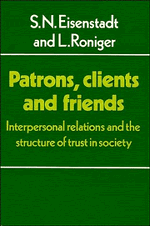Book contents
- Frontmatter
- Contents
- Preface
- 1 PERSONAL RELATIONS, TRUST AND AMBIVALENCE IN RELATION TO THE INSTITUTIONAL ORDER
- 2 THE CONSTRUCTION OF TRUST IN THE SOCIAL ORDER AND ITS AMBIVALENCES: VIEWED FROM THE DEVELOPMENT OF SOCIOLOGICAL THEORY
- 3 THE STRUCTURING OF TRUST IN SOCIETY: UNCONDITIONALITIES, GENERALISED EXCHANGE AND THE DEVELOPMENT OF INTERPERSONAL RELATIONS
- 4 THE BASIC CHARACTERISTICS AND VARIETY OF PATRON–CLIENT RELATIONS
- 5 THE CLIENTELISTIC MODE OF GENERALISED EXCHANGE AND PATRON–CLIENT RELATIONS AS ADDENDA TO THE CENTRAL INSTITUTIONAL NEXUS
- 6 THE SOCIAL CONDITIONS GENERATING PATRON–CLIENT RELATIONS
- 7 VARIATIONS IN PATRON–CLIENT RELATIONS
- 8 RITUALISED INTERPERSONAL RELATIONS; PRIVACY AND FRIENDSHIP
- 9 CONCLUDING REMARKS: THE DIALECTICS OF TRUST AND THE SOCIAL ORDER
- Notes
- Index
9 - CONCLUDING REMARKS: THE DIALECTICS OF TRUST AND THE SOCIAL ORDER
Published online by Cambridge University Press: 01 June 2011
- Frontmatter
- Contents
- Preface
- 1 PERSONAL RELATIONS, TRUST AND AMBIVALENCE IN RELATION TO THE INSTITUTIONAL ORDER
- 2 THE CONSTRUCTION OF TRUST IN THE SOCIAL ORDER AND ITS AMBIVALENCES: VIEWED FROM THE DEVELOPMENT OF SOCIOLOGICAL THEORY
- 3 THE STRUCTURING OF TRUST IN SOCIETY: UNCONDITIONALITIES, GENERALISED EXCHANGE AND THE DEVELOPMENT OF INTERPERSONAL RELATIONS
- 4 THE BASIC CHARACTERISTICS AND VARIETY OF PATRON–CLIENT RELATIONS
- 5 THE CLIENTELISTIC MODE OF GENERALISED EXCHANGE AND PATRON–CLIENT RELATIONS AS ADDENDA TO THE CENTRAL INSTITUTIONAL NEXUS
- 6 THE SOCIAL CONDITIONS GENERATING PATRON–CLIENT RELATIONS
- 7 VARIATIONS IN PATRON–CLIENT RELATIONS
- 8 RITUALISED INTERPERSONAL RELATIONS; PRIVACY AND FRIENDSHIP
- 9 CONCLUDING REMARKS: THE DIALECTICS OF TRUST AND THE SOCIAL ORDER
- Notes
- Index
Summary
The foregoing summary description of the different patterns of interpersonal relations that develop in various societies of sectors thereof – together with the more detailed analysis of different patterns of patron–client relations presented above – enables us to draw some (even if preliminary) conclusions, not only as we have done in the preceding chapters about the social conditions which generate different patterns of such interpersonal relations, but also about the central analytical focus of our discussion – namely about the ambivalence and dialectics of trust in the social order. These are above all manifest in the relations between the modes of construction of trust in the institutional order and the attempts at the construction of new areas of trust – and of participation in the realm of some pristine, common meaning – in the various types of interpersonal relations, seemingly beyond this order or in opposition to it.
We have seen that, whatever the differences between various types of such interpersonal relations, they all tend to construct realms of trust and of participation in a spiritual realm beyond the major institutionalised sectors of a society – specifically, but not exclusively, beyond that of kinship – in which trust and participation in the realm of meaning are seemingly most fully institutionalised.
- Type
- Chapter
- Information
- Patrons, Clients and FriendsInterpersonal Relations and the Structure of Trust in Society, pp. 294 - 301Publisher: Cambridge University PressPrint publication year: 1984



